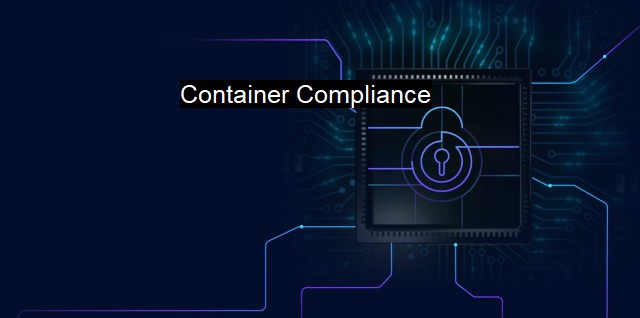What is Container Compliance?
Importance of Container Compliance and Antivirus Management: Ensuring Cybersecurity in Modern IT Environments
"Container Compliance" is a critical factor understanding container compliance specifically in the context of cyber security and antivirus requires us to parse the terms as individual elements with their applicability.A 'container' is a lightweight, standalone, executable software package that includes everything needed to run a piece of software: the code, runtime, system tools, system libraries, and settings. Containers in enterprise IT and software development have drastically changed how applications are deployed and managed. They make it efficient to package, ship, and run applications on any platform that supports containerization. just like with any technology, they also introduce new vectors for cyber threats.
Compliance, on the other hand, refers to the ability to follow a specific set of rules or regulations established by an organization or regulatory body to ensure security, data integrity, confidentiality, and system availability. Compliance helps in preventing and detecting violations in cybersecurity standards, laws, or practices that put the organization at risk.
When combined, "Container Compliance" refers to the set of standards and procedures needed to ensure that a container follows particular security guidelines and rules. As the use of containerized applications grows, ensuring container compliance becomes vitally important in maintaining security, especially when taking into account the multitude of guidelines and rules that must be adhered to when managing sensitive data.
There are many ways that a container can be vulnerable to different cyber threats. For instance, containers can be targeted by malware, ransomware, phishing attacks, Advanced Persistent Threats (APTs), and more. Improperly configured containers can allow attackers to get privileged access or even execute arbitrary code inside the container, which could lead to a full-blown data breach. Therefore, ensuring container compliance is a necessity to prevent these kinds of threats and attacks.
Container compliance helps organizations follow various regulatory mandates such as HIPAA for health institutions, PCI DSS for credit card processing, or GDPR for protecting data of European Union citizens. These compliance regulations have specific rules and guidelines about how to secure data and systems, including those hosted in the containerized environment. An organization that doesn’t have in place a container compliance strategy risks substantial fines and other penalties.
In a world increasingly threatened by sophisticated cyber-attacks, companies must continuously evaluate their container compliance strategies. This involves monitoring the latest industry compliance standards, regularly auditing their container environments, and carrying out efficient software updates. Antivirus is also an essential tool in the cybersecurity landscape, which, tied in with container security, plays a vital role in getting ahead of cybercriminals and protecting from threats while ensuring compliance.
The container-specific antivirus protects the containers and mitigating the unwanted side effects of threats by scanning for malicious activities, quarantining infected files or isolating containers to prevent the spread of the contagion, and of course, leveraging all these to ensure adherence to the established norms and hence the state of being compliant.
It's worth focusing on the pivotal role of continuous education in maintaining container compliance. Companies need to ensure that their developers and IT staff are fully versed on the latest threats, the importance of container-specific antivirus measures, and the wider cybersecurity landscape. By doing so, organizations can build a robust Container Compliance strategy which will not only protect them from potential threats but equip them to quickly respond and recover from any security breach, maintaining business continuity in an ever-evolving technological era.

Container Compliance FAQs
What is container compliance and why is it important in cybersecurity and antivirus?
Container compliance refers to ensuring that the containers used for storing or deploying software are built, configured, and managed in compliance with the specific regulatory and security requirements. As containers are more widely used in software development and deployment, it is important to ensure that they are compliant with cybersecurity and antivirus policies to mitigate against potential security risks.What are the common compliance regulations that containers need to comply with?
There are several regulations and standards that containers need to comply with, such as HIPAA, PCI-DSS, GDPR, and ISO 27001. HIPAA regulates the security of patient data in healthcare, while PCI-DSS outlines security requirements for processing credit card information. GDPR pertains to the handling of personal data, and ISO 27001 specifies best practices for information security management.How can antivirus software be used to ensure container compliance?
Antivirus software can be used to scan container images and detect any malware or vulnerabilities that could pose a security risk. This helps to ensure that the containers are secure and compliant with the antivirus policies. In addition, regular updates and patches should be applied to the antivirus software to stay current with the latest threats and vulnerabilities.What are some best practices for ensuring container compliance in cybersecurity and antivirus?
Some best practices for ensuring container compliance include using secure container images from trusted sources, employing strong access controls and user authentication, regularly scanning containers for vulnerabilities and malware, maintaining up-to-date antivirus software, and having clear policies and procedures for container management and compliance. Regular training and education for employees on container security best practices is also important.| | A | | | B | | | C | | | D | | | E | | | F | | | G | | | H | | | I | | | J | | | K | | | L | | | M | |
| | N | | | O | | | P | | | Q | | | R | | | S | | | T | | | U | | | V | | | W | | | X | | | Y | | | Z | |
| | 1 | | | 2 | | | 3 | | | 4 | | | 7 | | | 8 | | |||||||